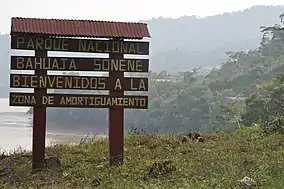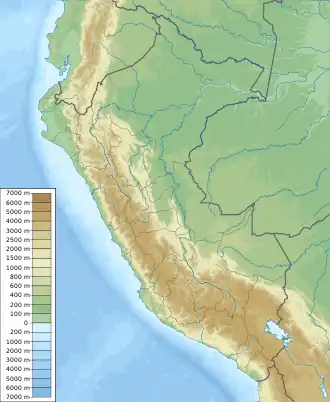Bahuaja-Sonene National Park
Bahuaja-Sonene National Park (Spanish: Parque Nacional Bahuaja-Sonene) is a protected area located in the regions of Puno and Madre de Dios, in Peru.[1]
| Bahuaja-Sonene National Park | |
|---|---|
| Parque Nacional Bahuaja-Sonene | |
 Signboard at the entrance of the buffer zone. Bahuaja Sonene National Park. | |
 | |
| Location | Peru Madre de Dios, Puno |
| Nearest city | Puerto Maldonado |
| Coordinates | 13°16′S 69°27′W |
| Area | 1,091,416 hectares (4,213.98 sq mi) |
| Established | 17 July 1996 |
| Governing body | SERNANP |
Geography
The park comprises river terraces, hills and mountains, with elevations ranging from 500 to 2450 m.[2] The main rivers in the area are: Heath, Tambopata and Candamo.[2] The park shares borders with Madidi National Park in Bolivia to the east and Tambopata National Reserve to the north.[1][2]
Ecology
Flora
Plant species found inside the park include: Virola sebifera, Cedrela odorata, Spondias mombin, Celtis schippii, Bertholletia excelsa, Ficus insipida, Hevea guianensis, Cedrelinga cateniformis, Iriartea deltoidea, Calycophyllum spruceanum, Guadua weberbaueri, Theobroma cacao, Miconia spp., Annona ambotay, Swietenia macrophylla, Myroxylon balsamum, Astrocaryum murumuru, Enterolobium cyclocarpum, Mauritia flexuosa, etc.[2]
Fauna
Birds found inside the park include: the white-tailed goldenthroat, the Neotropic cormorant, the blue-and-yellow macaw, the harpy eagle, the white-throated toucan, the horned curassow, the great egret, the scarlet macaw, the bat falcon, the jabiru, the swallow-tailed hummingbird, etc.[2]
Mammals found in the park include: the giant otter, the South American tapir, the marsh deer, the jaguar, the maned wolf, the puma, the bush dog, etc.[2]
Environmental issues
The park is rich in natural resources including timber, gold, rubber, and wild game. The Candamo deposit (Block 78), which contains 3 trillion cubic feet (85 km3) of natural gas and 120 million of barrels of natural gas condensates, was formerly owned by Mobil and now lies partly within the reserve. Legislation proposed in 2007 to remove the block from the reserve was turned down.[3]
References
- "Bahuaja Sonene - Servicio Nacional de Áreas Naturales Protegidas por el Estado". www.sernanp.gob.pe (in European Spanish). Archived from the original on 2016-09-03. Retrieved 2018-11-18.
- (INRENA), Instituto Nacional de Recursos Naturales (2003). "Parque Nacional Bahuaja Sonene: plan maestro 2004 - 2008" (in Spanish): 19, Anexo 9, Anexo 12.
{{cite journal}}: Cite journal requires|journal=(help) - Kuramoto, Juana. The Hydrocarbons Industry in Peru. Instituto de Estudios Superiores de Administración.
Further reading
- Thomsen, JB.;Mitchell, C.;Piland, R.; Donnaway, JR. Monitoring impact of hydrocarbon exploration in sensitive terrestrial ecosystems: perspectives from Block 78 in Peru. In: Bowles IA, Prickett GT., editors. Footprints in the jungle. New York: Oxford University Press; 2001. p. 332.